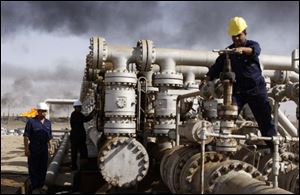
Iraq says its oil supply will help stabilize price
6/7/2010
Iraqi workers are seen at the Rumaila oil refinery, near the city of Basra, Iraq, in this Dec. 13, 2009 file photo.
KUALA LUMPUR, Malaysia — Iraqi's oil minister said Monday an expected surge in his country's oil supply over the next few years will provide a “safety valve” to stabilize volatile oil prices.
Hussain al-Shahristani said Iraq's oil production capacity is expected to more than quadruple to 12 million barrels a day by 2017 with up to a dozen deals with international oil companies awarded in recent years.
“Our projection for the next two decades is that the world will require additional oil. There is no other source that can replace oil ... any additional demand for oil particularly in Asian markets will have to be met by Iraqi oil,” he told a regional oil and gas conference.
But analysts say the lack of a petrochemical law, ongoing insurgent attacks and uncertainty about who will lead the next government continue to be challenges to developing Iraqi's oil sector.
They say Iraq's forecast of 12 million barrels a day in production capacity is unrealistic given continuing security issues and the condition and limits of Iraq's current oil infrastructure, including pipelines.
Al-Shahristani, who has said current world crude prices were reasonable, pledged Iraq would not “flood the market” to influence oil prices. Prices have dropped to about $70 a barrel now, from more than $140 two years ago.
“We will only produce what the market requires,” he said. “I believe the Iraqi supply will provide a safety valve to dampen oil price volatility ... and ensure dependable long term oil supply to the energy market.”
Iraq, which sits atop the world's third largest proven reserves of conventional crude oil, has staked its economic recovery on developing its oil sector after years of sanctions and war.
Oil revenues make up nearly 95 percent of Iraq's income. The Baghdad government is relying on 12 deals with international oil companies, 11 of which were the result of two international bidding rounds last year, to dramatically increase oil output in future years.
Al-Shahristani said estimated investment in the 11 oil fields is about $150 billion, with combined production capacity of more than 60 billion barrels of oil over the next two decades.
He said the government will open bidding for three gas fields in September, with combined reserves of 25 trillion cubic feet.
Iraq also plans to build four new refineries that will help it become a net exporter of petroleum products in the next few years, he said.
In an opening address to the conference, Malaysian Prime Minister Najib Razak called for greater oversight of financial markets to prevent manipulation of oil prices. He said oil prices, at current levels, are bound to come under renewed pressure as the global economic recovery gains momentum.
“In today's environment, unjustifiably high oil prices would risk jeopardizing the fragile recovery and undermine the stability of the global economy,” he warned.
U.S. giant Exxon Mobil Corp. Senior Vice-President Andrew P.Swiger told the conference that global energy demand is expected to increase by almost 35 percent by 2030 from 2005 levels with sharp growth seen in Asia.
There are still abundant supplies worldwide but he said the key challenge is in marshaling massive investment, technological and management expertise to safely and effectively develop the resources.